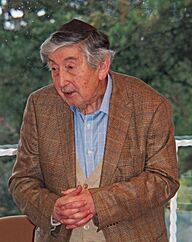Otto Hutter facts for kids
Quick facts for kids
Otto Hutter
|
|
|---|---|

Hutter in 2014
|
|
| Born |
Otto Fred Hutter
29 February 1924 Vienna, Austria
|
| Died | 22 November 2020 (aged 96) Bournemouth, England
|
| Citizenship | British (from 1947) |
| Alma mater | University College London |
| Known for |
|
| Spouse(s) | Yvonne Hutter |
| Awards |
|
| Scientific career | |
| Fields |
|
| Institutions | |
| Doctoral advisor | Sir Charles Lovatt Evans |
| Notable students | Denis Noble |
Otto Fred Hutter (born February 29, 1924 – died November 22, 2020) was an important scientist. He was born in Austria but became British. Otto Hutter was a physiologist, which means he studied how living things work. He was a special professor at the University of Glasgow in Scotland.
Contents
Early Life and Education
Otto Hutter was born in Vienna, Austria, in 1924. His father, Isaak, came from a place called Lviv, which is now in Ukraine. His father fought in World War I before settling in Austria. Otto's mother, Elisabeth, was a nurse.
Otto went to secondary school at the Zwi Perez Chajes Gymnasium. In December 1938, he had to leave Vienna. This was part of the Kindertransport program. This program helped Jewish children escape from Austria. Germany had taken over Austria, and it was not safe for Jewish people.
After arriving in the UK, Otto went to Bishop Stortford College. He became a British citizen in 1947.
First Job
From 1942, after finishing school, Otto worked as a lab helper. He was at the Wellcome Research Laboratories in Beckenham, Kent. One of his jobs was to help make sure penicillin was produced correctly. Penicillin is a medicine that fights infections. This work was very important during the war.
University Studies
Otto Hutter studied physiology at Chelsea Polytechnic. He also studied chemistry at Birkbeck College. He took these classes in the evenings during the war. When the war ended, he went to University College London. There, he earned a degree in physiology.
Scientific Discoveries
Otto Hutter's first research looked at how a chemical called acetylcholine affects nerves and muscles. Later, he studied how potassium ions move into muscle cells. Ions are tiny charged particles.
Heartbeat Research
Otto received a special scholarship to study in Baltimore, USA. He worked with another scientist, Wolfgang Trautwein. They used tiny tools called microelectrodes to study the heart. They were the first to record the "pacemaker potential" in heart muscle. This is the electrical signal that makes your heart beat regularly.
They studied how chemicals like acetylcholine (which slows the heart) and adrenaline (which speeds it up) affected the heart. Their recordings, made from a tortoise heart, are now famous. You can find them in many medical textbooks.
Chloride Ions
Another big area of Otto Hutter's research was the physiology of the chloride ion. He wrote a special report about his findings in this field.
Professor at Glasgow
Otto Hutter was a lecturer at University College, London, until 1971. Then, he became a special professor at the University of Glasgow. He retired from this important role in 1990.
Later Years
In 2000, Otto Hutter started an annual lecture series in Glasgow. These lectures remember the Holocaust. In 2018, he gave one of these lectures himself. It was called Exodus from Vienna. He shared the story of what happened to his 37 classmates from his old school. Otto visited his childhood home in Vienna in 2007.
Some of Otto Hutter's grandchildren live in Israel. After visiting the country many times, Otto became an Israeli citizen when he was 95 years old.
Family Life
Otto Hutter met Yvonne Brown, who was a nurse, while he was working in Beckenham. They got married in 1948. They had two sons and two daughters. Sadly, his wife and one of his daughters passed away before him.
Death
Otto Hutter died on November 22, 2020. He was 96 years old.
 | Sharif Bey |
 | Hale Woodruff |
 | Richmond Barthé |
 | Purvis Young |

